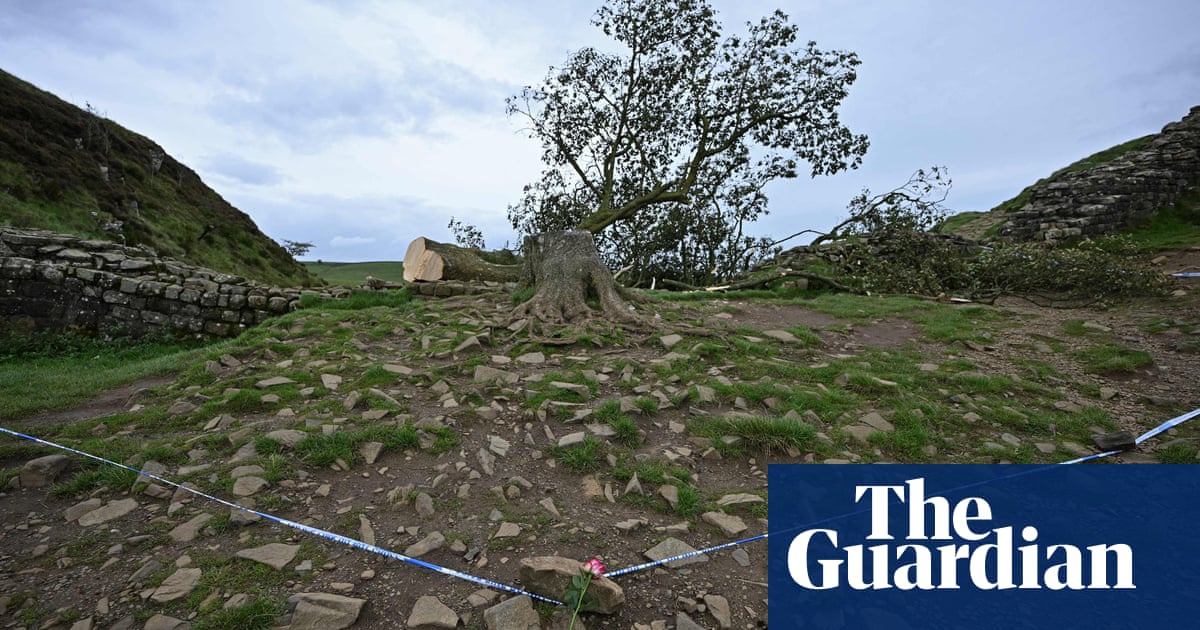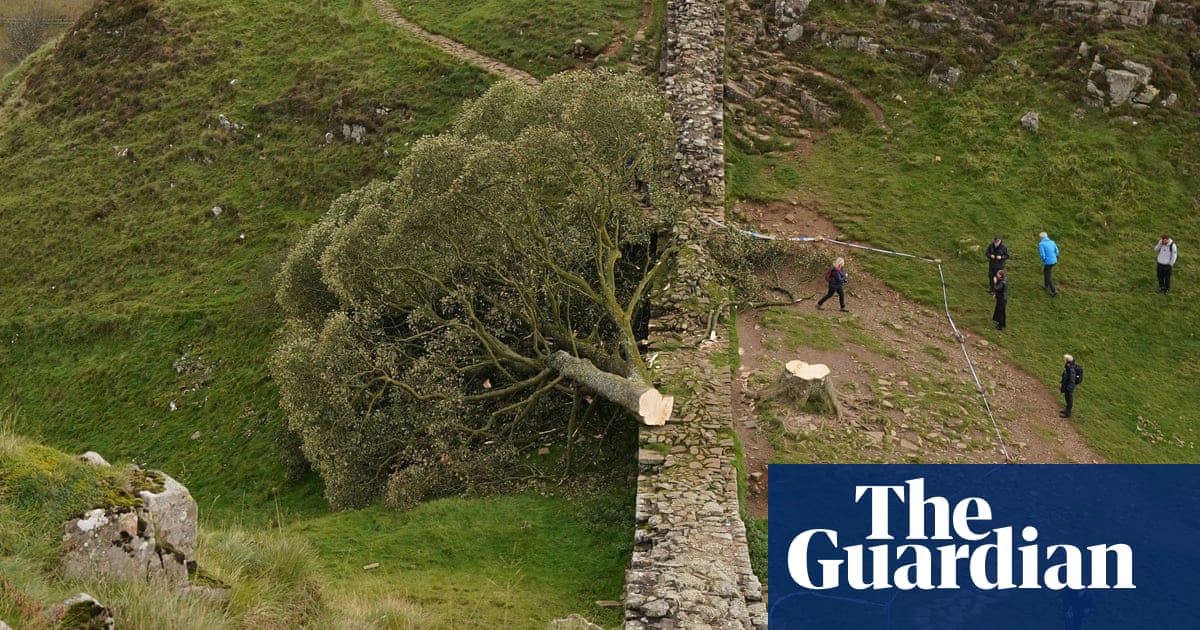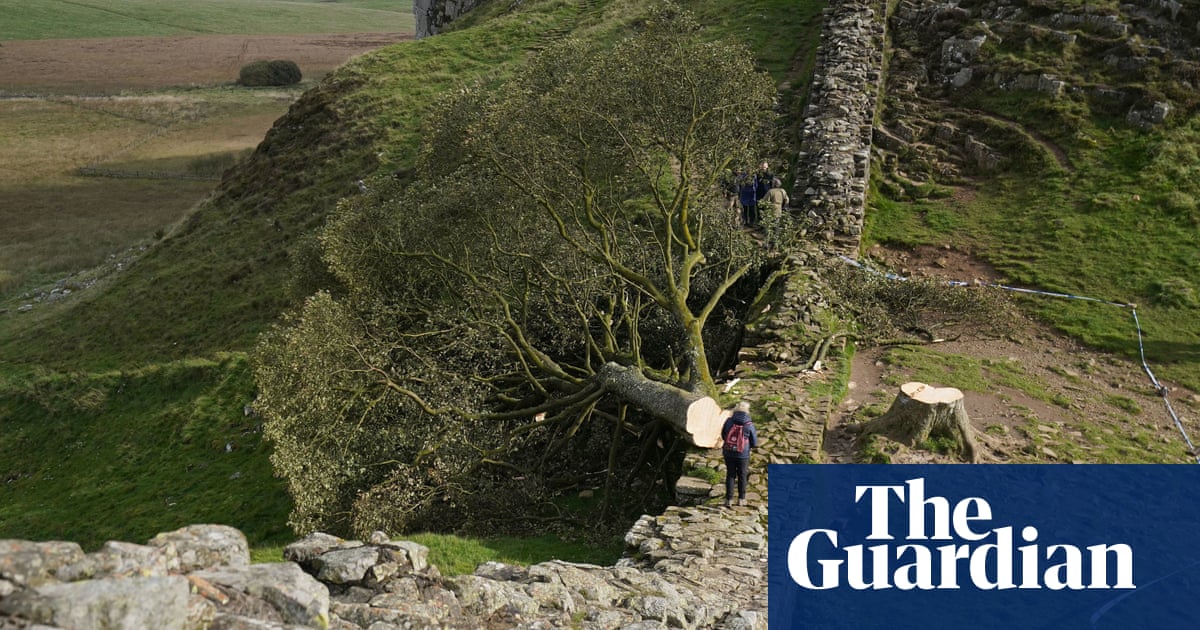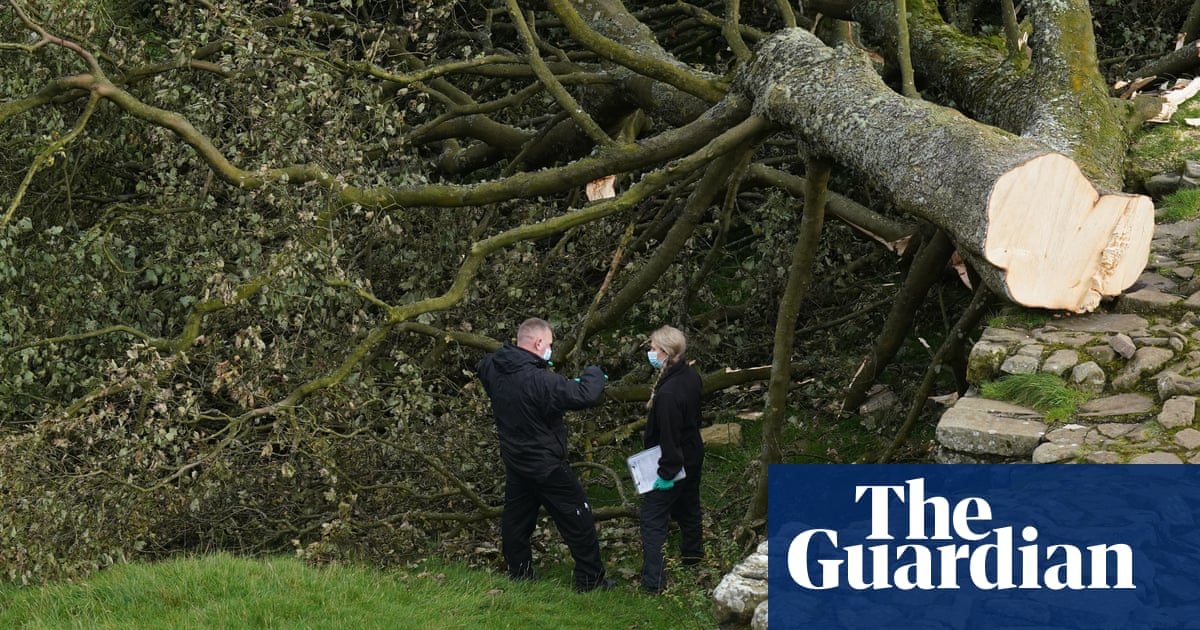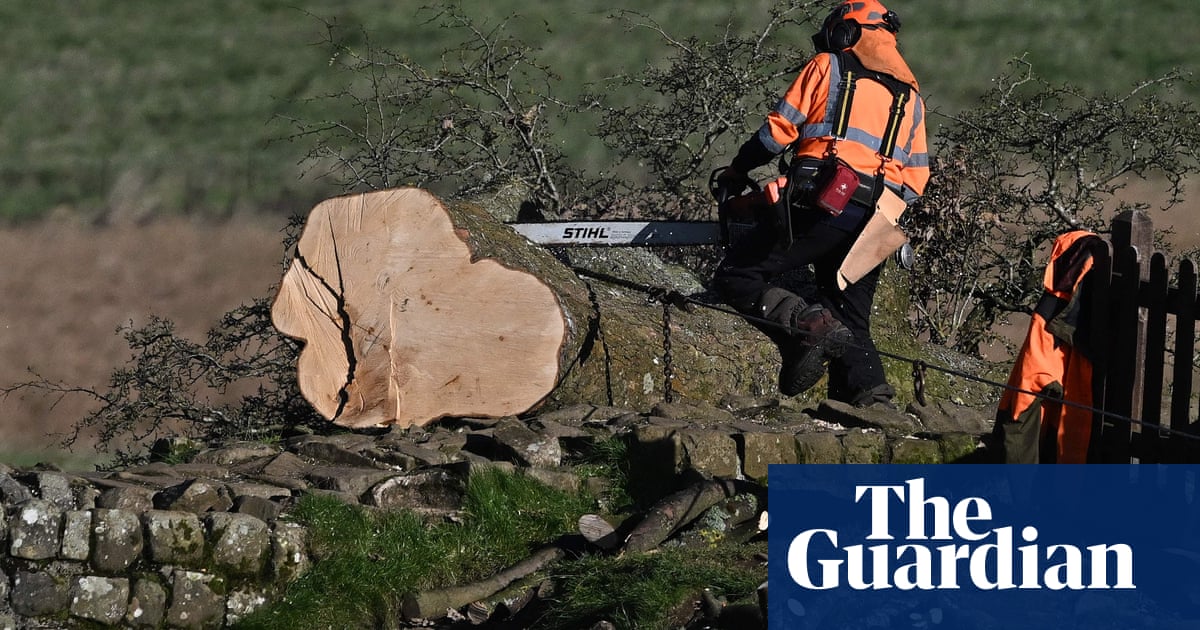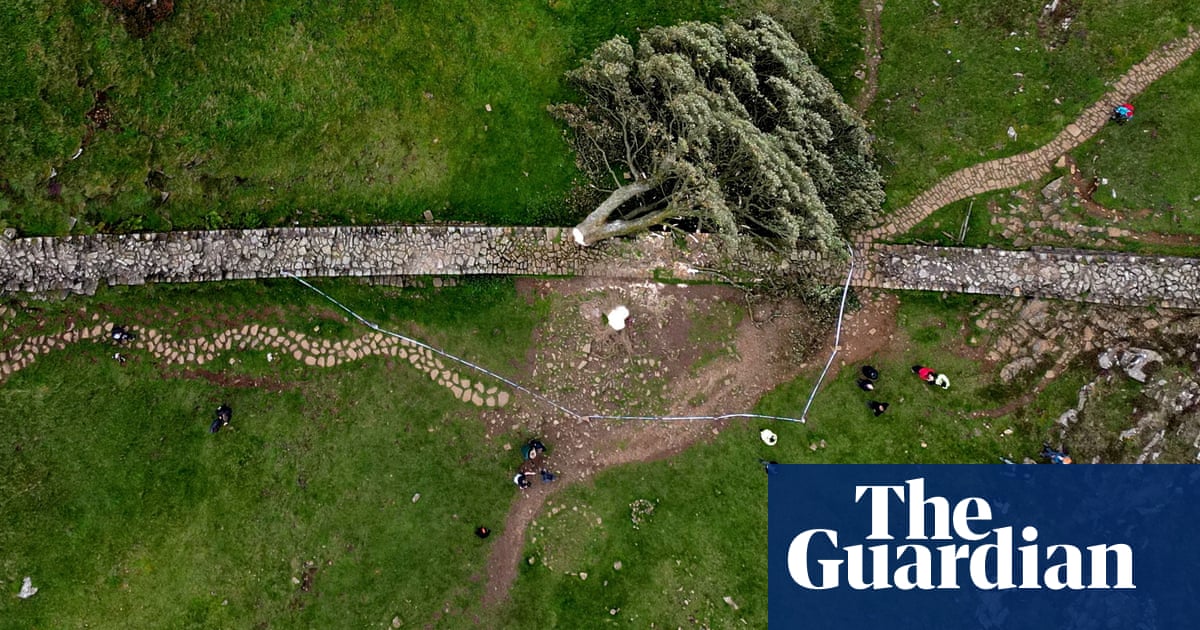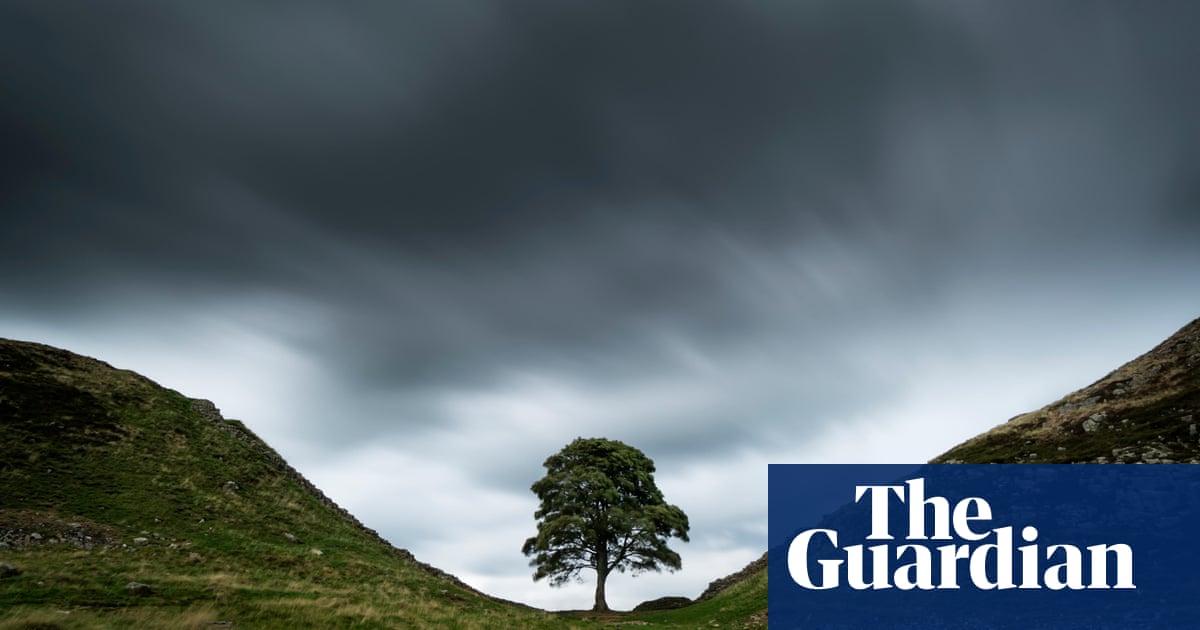
There is a big hole at Sycamore Gap on the route of Hadrian’s Wall in Northumberland after a 300-year-old tree was chopped down. Many are mourning the loss of the world-famous tree but amid the gloom, ideas are flooding in about what to do next. A stone circle, a sculpture of the tree, or a metal replica where it fell have all been floated, and one man even went to a local garden centre and planted a young sapling himself, although this was removed by the National Trust. Here are some of the options.
Plant a new tree
Most people want a new tree, says Steve Blair, the general manager of the the Twice Brewed Inn, which is near the tree, and uses its image as the pub’s logo.
“Local people would love to have the tree replaced, and the original tree made into some memorial, so at least something good has come out of this bad thing,” he said.
Blair set up a JustGiving page and has already raised £4,800 to fund a “lasting memorial” to the tree. The pub previously offered a £1,500 bar tab reward for anyone with information that would lead to an arrest.
Replanting a tree in the space, however, could be more complex than it seems.
“We didn’t say replace the tree because we didn’t want to build people’s hopes up that we could plant a new tree, because it’s not as simple as that – it may never ever happen,” Blair said. This is because removing the stump and roots could damage the archaeological site.
“The Roman wall and Sycamore Gap tree itself are protected – getting the roots out would mean digging on a world heritage site which would be a big no-no.”
A sapling would take hundreds of years to reach the height of the old tree, and some feel they can’t wait.
Peter Clark, from Tynemouth, has already offered to donate a 150-year-old sycamore to replace the current one. He wrote on his Facebook page: “It’s in sandy/loam soil so it would be easy to move.”
However, experts have raised doubts as to whether this would be possible, partly because the wall would need to be excavated, but also because it is such a harsh environment in which to survive – another reason why the felled tree was considered a symbol of resistance.
Mark Feather, UK estate manager at the Woodland Trust, said one possibility was to plant seeds from the original tree now, and grow a sapling. “In a few years, when it’s strong enough, it can be planted on the hillside next to its predecessor.” National Trust rangers have been out collecting seeds and pieces of the tree to try to make that happen.
Feather said: “It would be better starting with a younger sapling that gets adjusted to that harsh and exposed situation. I think it would be difficult to establish a very mature tree in that situation.”
See what the stump does
Feather advocates doing nothing for a couple of years and see if the stump sprouts. “I think it would be worthwhile to see whether that develops, but I think you will need a Plan B, if it doesn’t happen,” he says.
This is because sycamore – like many trees – can produce new shoots from around the base even after they have been chopped down. Multiple stems could come up, and with decades of management and chopping back smaller stems, you could recreate one central stem.
With mature trees, however, this doesn’t always happen, and the process would take several years. “We can’t replace it, [but] we can try and make the best of it,” he said. The National Trust and Northumberland national park are also hoping the tree might regrow.
Make a memorial out of the wood
Feather believes the tree is still valuable, not just for its treasured place in the landscape, but also for its timber. “We should appreciate trees for the multifunctional role that they provide to society,” he said.
He suggests producing a piece of furniture such as a bench near the tree as a memorial to it. Displaying a cross-section of the trunk would allow people to see inside the original tree, and appreciate its value.
Making things out of the wood could also help raise funds for a replacement. “It could be a tribute to the tree,” he said.
The Woodland Heritage charity is offering to collect and preserve the tree’s remains so it can be made into furniture such as chairs, tables and benches. David Cracknell, vice-chair of Woodland Heritage, said in a statement: “The felling of this wonderful historic tree was a horrendous act of vandalism, but we would be delighted to offer our skills and services to the National Trust for free to play a part in making sure that some good comes out of it.
“Let’s make this a national project and launch a competition for ideas of what to do with the sycamore trunk.”
Replacing a single tree with a forest
Poet Robert Macfarlane suggested planting a forest. “The best way to remember the loss of the tree, I would say, is with the gain of the forest,” he told the Guardian on Friday. “We are drastically deforested, we have the second lowest forest cover in Europe. Let us reforest the uplands.”
However, Feather said the image of a single tree growing in the gap was a powerful one. He said: “Forests are lovely, and beautiful to create. But this is an individual, iconic tree. It shows you the value of even one tree in the right position with the right form. I think it would be nice to celebrate the individual trees rather than a woodland, in this instance.”




